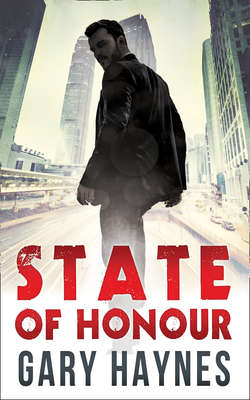Читать книгу State Of Honour - Gary Haynes - Страница 22
13.
ОглавлениеAn hour later, Crane told Tom that he’d swung it, and that the old man had asked him to join them for an initial in thirty minutes’ time.
The secure conference room was thirty metres square, the massive windows obscured by gleaming Venetian blinds. Tom sat at a large pine table on one of the matching rattan-wicker chairs, his brown loafers resting on coral-blue tiles. Crane said that it had been swept for bugs ten minutes before. Behind the locked door, two Marines ensured that they wouldn’t be disturbed.
“The ISI are playing hard ball,” Houseman said, cradling a fist. “But we have no jurisdiction here. They won’t allow the FBI to investigate. Anyone else in the US intelligence community, either.”
“They’re in a difficult position,” Crane said. “If they’re seen to be too pro-West, they’ll play into the hands of the Pakistan Taliban. And they got enough on their plate with the Shia Leopards just now. On the other hand, if they alienate us, they won’t get what they want.” He pinched an ear lobe, looking a little smug.
“Which is exactly?” Tom asked.
“About ten US divisions heading into Tehran,” Houseman said.
“We should leave them to fight their own battles. The Pakistanis double-crossed us,” Crane said, his tone surly. “Goddamned lying sons of bitches who caused the deaths of thousands of US and coalition forces.”
Tom knew Crane was referring to bin Laden. If it weren’t for the Pakistanis, he would’ve been captured in Tora Bora back in 2001. A bunch of al-Qaeda and Taliban lieutenants, too. After that, the ISI babysat thousands of insurgents in the Pakistan Tribal Areas. Then they just picked up where they’d left off. When bin Laden’s six-year holiday in Abbottabad was factored in, Tom was inclined to agree with Crane.
“That maybe, but I want to know what we’re going to do to find Lyric?” he asked, a little more bluntly than he’d intended.
“My money’s still on the Leopards,” said Crane. “Backed by the Iranians.”
“The ISI had to be involved,” Tom said. “The assault couldn’t have happened if they’d done what they said they would. The helicopter didn’t arrive on time. The snipers just disappeared. And it was too well organized.”
Houseman cleared his throat. “Listen, son. The Leopards have ex-military in their ranks. They were capable of it. The Iranians equip them with top weaponry. We ain’t dealing with farmers with AK-47s here. The building was razed to the ground by thermobaric charges.” He snatched up a bottle of water, took a frustrated pull.
Tom saw Crane staring at him.
“When a country is going down the tubes, people start to do all sorts of weird things. It could be as simple as rogue elements,” Crane said. “Or just plain corrupt ones. God knows it’s a national disease. Besides, the ISI are saying it was Shia traitors in their ranks. Shia cops, too. You remember when Indira Gandhi, the Prime Minister of India, got assassinated?”
Tom nodded.
“Then you’ll recall it was two of her own bodyguards. Peppered her with thirty rounds. Sikhs, who did it for revenge after the army stormed their temple and killed hundreds. Religion in these parts overrides any other affiliation.”
Tom studied Crane’s face. He guessed he’d been a handsome man once. But now his features looked tired, his eyes hooded, his mouth drooping at the sides.
Houseman banged the bottle on the table, as if he wanted Tom to stop staring. Clenching his jaw muscles, the old man said, “Up until the generals took over here, the Pakistanis were talking about declaring war on us if we attacked the Iranians. That gives you a hint at how complicated this area of the world is. They were buddies; now the Pakistanis regard Iran as an existential threat.”
“I don’t get it,” Tom said.
“You obviously ain’t heard of the Iran-Pak gas pipeline,” Crane said. “The Pakistanis have an ongoing energy crisis. They figured sidling up to the Iranians would go a long way to fixing that. The thing is now, the new Sunni regime here wouldn’t let an Iranian pipeline cross their land if their lives depended on it.”
“I thought the Iranians wanted to invade Balochistan to get their hands on natural gas,” Tom said.
“You’re right. They’ve got the resources to find and extract it. The Pakistanis don’t. All their efforts are focused on national security.”
“And so what now?” Tom asked, pursing his lips, feeling a little out of his depth.
“There are no contingency plans for such a kidnapping,” Crane said. “Not on foreign soil that ain’t fully cooperative. That’s the risk, and Lyric knew it.” He sat back in his chair, began riding it, as appeared to be his habit.
Tom bristled. “What are you saying?”
Crane ignored him. “The flight to Kabul leaves in twenty minutes. Get what you need.”
“Wait a second. Lyric is very likely to be right here in Islamabad. And we’re leaving?”
“POTUS has ordered the closure of the embassy in forty-eight hours,” Houseman said. “You come to Kabul with us or you go home.”
“I’m sorry, sir,” Tom said. “But why Kabul?”
“The flight time is thirty-five minutes,” Houseman said. “We still got a fully operational set-up there. Otherwise we’d be flying back to the States and doing this from a computer screen at Langley. Now get outta here before I change my mind.”
Reluctantly, Tom stood up and strode over to the door. They hadn’t said anything explicitly, but he guessed the real meeting would begin as soon as he reached the corridor outside.
